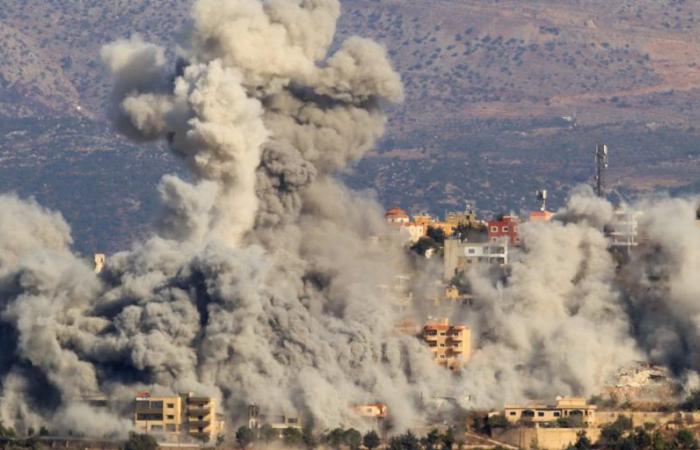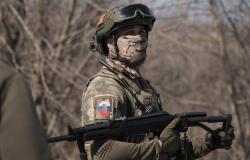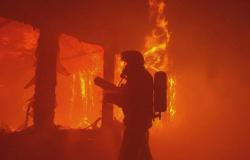The Israeli army carried out a new round of strikes on the south of Beirut, stronghold of the Shiite movement Hezbollah, in the night from Thursday to Friday, in one of the most violent raids since Israel intensified its bombing campaign on the country on September 23.
The Israeli army said Thursday that it would continue to inflict “severe blows” on Hezbollah, after three days of ground fighting against the armed Islamist movement in southern Lebanon which cost the lives of nine of its soldiers. According to official figures, nearly 2,000 people have been killed in Lebanon in a year of cross-border violence between Hezbollah and the Israeli army, including more than a thousand since September 23. The Lebanese government estimates the number of displaced people at around 1.2 million.
Thursday evening, “Israel struck the southern suburbs (of Beirut) eleven times in a row,” said a source close to the Islamist movement, on condition of anonymity. The official Lebanese news agency ANI reported “more than ten consecutive strikes”, in “one of the most violent raids on the southern suburbs of Beirut since the start of the Israeli war against Lebanon”. .
The main information to remember:
– The Israeli army carried out a new round of strikes on the south of Beirut during the night from Thursday to Friday
– 37 people died in 24 hours in various Israeli strikes
– According to the American site Axios, Hachem Safieddine, potential successor to Hassan Nasrallah at the head of Hezbollah, was targeted by Israeli attacks on Wednesday evening
Hezbollah claims to have again targeted an Israeli force on the border in southern Lebanon
Hezbollah said Friday it launched artillery shells and rockets against an Israeli force advancing west from the border village of Yaroun in southern Lebanon.
The powerful pro-Iranian formation had earlier announced that it had fired artillery on Israeli soldiers in the Maroun al-Ras area, located on the Lebanese side of the border.
2,000 sites hit in four days of fighting in southern Lebanon
The Israeli army said on Friday that it had struck more than 2,000 sites, including infrastructure and weapons, in southern Lebanon since the start of its ground offensive on Monday against the Islamist movement Hezbollah, supported by Iran.
“More than 2,000 military targets were struck, including terrorists, infrastructure (…), military buildings, weapons warehouses,” the army said in a statement.
Israel says it has killed 250 Hezbollah fighters since ground offensive began on Monday
The Israeli army said Friday it had killed 250 Hezbollah fighters in southern Lebanon since the start of the ground offensive Monday in southern Lebanon against the Iran-backed Islamist movement. In total “250 Hezbollah terrorists, including 21 commanders, were eliminated in four days of operations (…) in southern Lebanon,” the army said in a statement.
Israel ‘doesn’t have much longer,’ Iran’s supreme leader threatens
In a speech, Iranian Supreme Leader Ali Khamenei said that Israel “does not [avait] not for much longer.”
A source close to Hezbollah tells AFP that Nasrallah has been “temporarily” buried
Hezbollah leader Hassan Nasrallah, killed a week ago in an Israeli strike in Lebanon, was buried “temporarily” in a secret location for fear that his funeral would be targeted by Israel, a source told AFP on Friday close to Hezbollah. “Sayyed Hassan Nasrallah was buried in a temporary location, pending circumstances allowing a popular funeral,” said this source who requested anonymity.
She said a popular funeral in Beirut’s southern suburbs was impossible to hold at the moment “due to Israeli threats to target funeral participants and the burial site.” The Shiite Muslim rite allows burial in a temporary location in exceptional circumstances. The leader of Hezbollah was killed on September 27 in a spectacular Israeli strike on the southern suburbs of Beirut, a stronghold of the pro-Iranian formation. According to a Lebanese official who requested anonymity, Hezbollah tried, through Lebanese leaders, to obtain “guarantees” from the United States to organize popular funerals.
But due to continued Israeli raids on Lebanon, he was unable to obtain such guarantees. Hassan Nasrallah was killed along with four others, including the commander of the front with Israel in southern Lebanon and a senior official of the Iranian Revolutionary Guards, according to Hezbollah. Israel for its part claimed that he had been killed with around twenty members of Hezbollah. A week after his death, his successor has still not been appointed. His cousin Hachem Safieddine, a prominent figure in Hezbollah and closely linked to Iran, has been cited as his potential successor.
Highway linking Lebanon to Syria cut in two
The Lebanese news agency ANI reported that an Israeli raid on the border with Syria cut off the main road linking the two countries on Friday. Tens of thousands of people have fled in recent days from Lebanon, where Israel has carried out intense bombings against the Hezbollah movement, to Syria, mainly via this route.
Balls of flame
According to AFP correspondents, the strikes triggered car alarms and shook buildings in a wide area. AFP images showed giant balls of flame rising from the targeted site, with thick smoke and flares.
The strikes resonated as far as mountainous regions outside Beirut, according to the ANI agency. “During the night, the ground shook under our feet. The sky lit up” because of the force of the strikes and “the neighborhood became a ghost town,” Mohammed Sheaito, a driver, told AFP. 31-year-old taxi driver, in the southern suburbs of Beirut.
“We are afraid for our children, and this war is going to be long,” said Fatima Salah, a 35-year-old nurse. The Lebanese Ministry of Health announced on the night of Thursday to Friday the deaths of 37 people in 24 hours in various Israeli strikes.
One of Thursday’s strikes hit Hezbollah’s “intelligence headquarters” near Beirut, according to the Israeli army. According to the American site Axios, which cites three unidentified Israeli officials, Hachem Safieddine, potential successor to Hassan Nasrallah at the head of Hezbollah, was targeted on Wednesday evening by Israeli attacks. The Israeli army, questioned by AFP, has not yet confirmed this information.
Almost a year after the start of the war in the Gaza Strip, triggered by the unprecedented attack carried out on October 7, 2023 by Palestinian Hamas on Israeli soil, Israel announced in mid-September that it would move most of of its operations towards the northern front, on the Lebanese border. Israel said it would fight Hezbollah, an ally of Hamas, until “victory” to allow the return of around 60,000 residents of border regions displaced for a year by the Shiite movement’s incessant rocket fire towards the north of its territory.
Khamenei’s preaching
The now open war between Israel and Hezbollah is accompanied by an escalation between Israel and Iran, which fired 200 missiles into Israeli territory on Tuesday, leading to cross threats of retaliation between the two countries and new fears about a conflagration of the Middle East.
Iran claimed to respond to the assassination of Hassan Nasrallah, the leader of Hezbollah who died on September 27 in an Israeli strike near Beirut, and that of Ismaïl Haniyeh, the leader of Hamas killed on July 31 in an attack in Tehran attributed to Israel. Iran’s Supreme Leader, Ayatollah Ali Khamenei, is due to lead the weekly prayer at 10:30 a.m. (07:00 GMT) on Friday and deliver a sermon that could set the tone for Iran’s plans.
This rare speech must come three days before the first anniversary of the unprecedented attack by Hamas on Israeli soil. “We can avoid” a “total war” in the Middle East, US President Joe Biden said on Thursday, while the international community fears a large-scale conflict in the region.
Earlier Thursday, he said he was “in discussions” with Israel about possible strikes against oil installations in Iran, a country that is one of the ten largest oil producers. Oil prices jumped after this statement. The G7 countries expressed their “deep concern” about “the deterioration of the situation” in the Middle East.
“Shredded Bodies”
In the occupied West Bank, the Palestinian Authority announced Thursday evening the death of 18 people in an Israeli strike on the Tulkarem refugee camp. The Israeli army claimed to have “eliminated” a local Hamas leader, Zahi abd al-Razaq, alias Zahi Oufi.
This is the deadliest strike in the West Bank since 2000, a source within the Palestinian security services told AFP. Israel has occupied the West Bank since 1967. A witness, social worker Alaa Sroji, explained to AFP that an Israeli plane had “hit a cafeteria”. There are “children, young people whose bodies are torn to pieces,” he said.
The Israeli offensive continues in parallel on the Gaza Strip, devastated and besieged for a year. On Thursday, seven people were killed by Israeli strikes in different sectors of this Palestinian territory, according to Civil Defense, which also reported five deaths in new strikes on Friday.






